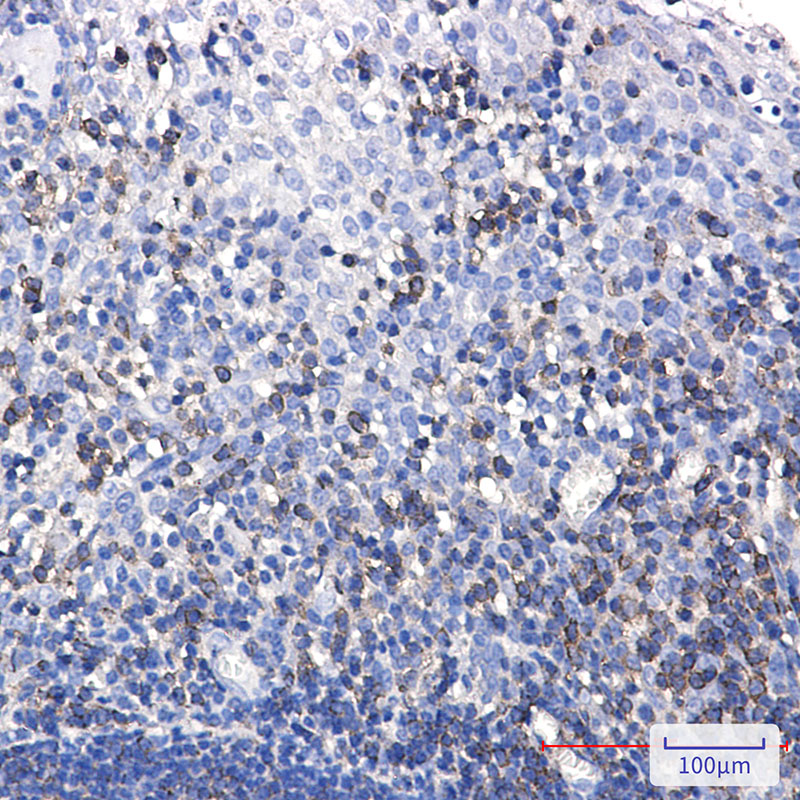

| WB | 1/500-1/1000 | Human,Mouse,Rat |
| IF | 咨询技术 | Human,Mouse,Rat |
| IHC | 1/50-1/100 | Human,Mouse,Rat |
| ICC | 技术咨询 | Human,Mouse,Rat |
| FCM | 咨询技术 | Human,Mouse,Rat |
| Elisa | 咨询技术 | Human,Mouse,Rat |
| Aliases | PTPN6; HCP; PTP1C; Tyrosine-protein phosphatase non-receptor type 6; Hematopoietic cell protein-tyrosine phosphatase; Protein-tyrosine phosphatase 1C; PTP-1C; Protein-tyrosine phosphatase SHP-1; SH-PTP1 |
| Entrez GeneID | 5777 |
| WB Predicted band size | Calculated MW: 68 kDa; Observed MW: 68 kDa |
| Host/Isotype | Rabbit IgG |
| Antibody Type | Primary antibody |
| Storage | Store at 4°C short term. Aliquot and store at -20°C long term. Avoid freeze/thaw cycles. |
| Species Reactivity | Human |
| Immunogen | A synthetic peptide of human SHP1 |
| Formulation | Purified antibody in TBS with 0.05% sodium azide,0.05%BSA and 50% glycerol. |
+ +
以下是关于SHP1抗体的3篇代表性文献的简要总结:
1. **文献名称**:*"The role of SHP1 in T cell receptor signaling"*
**作者**:Wu, H., et al.
**摘要**:该研究利用SHP1特异性抗体,通过免疫沉淀和Western blot技术,揭示了SHP1在T细胞受体(TCR)信号通路中的负调控作用,表明其通过去磷酸化关键信号分子(如ZAP-70)抑制T细胞活化。
2. **文献名称**:*"Development of a monoclonal antibody targeting SHP1 for immunohistochemical analysis in hematopoietic malignancies"*
**作者**:Kozlowski, M., et al.
**摘要**:研究者开发了一种高特异性的SHP1单克隆抗体,验证了其在石蜡包埋组织中的免疫组化适用性,并发现SHP1在部分白血病样本中表达显著降低,提示其作为潜在诊断标志物的价值。
3. **文献名称**:*"SHP1 regulates macrophage polarization via TLR4 signaling pathway"*
**作者**:Zhang, Y., et al.
**摘要**:通过SHP1抗体阻断实验,文章阐明了SHP1通过抑制TLR4/NF-κB通路调控巨噬细胞向M1表型极化,为炎症性疾病治疗提供了新靶点。
注:上述文献信息为示例性概括,实际研究中建议通过PubMed或Google Scholar以关键词“SHP1 antibody”、“PTPN6(SHP1基因名)”、“immunoblotting”等检索最新文献。
SHP1 (Src Homology 2 domain-containing protein tyrosine phosphatase-1), encoded by the *PTPN6* gene, is a non-receptor protein tyrosine phosphatase predominantly expressed in hematopoietic cells. It plays a critical role in regulating immune receptor signaling pathways, including those mediated by B-cell receptors (BCR), T-cell receptors (TCR), and Fc receptors. By dephosphoryling key signaling molecules, SHP1 suppresses activation signals, maintaining immune homeostasis and preventing hyperactivation linked to autoimmune disorders or inflammation. Dysregulation of SHP1. through mutations or altered expression, is implicated in diseases such as leukemia, lymphoma, and autoimmune conditions like lupus, highlighting its dual role as a tumor suppressor and immune checkpoint modulator.
SHP1 antibodies are essential tools for studying its expression, localization, and function. They enable detection via techniques like Western blotting, immunohistochemistry (IHC), and flow cytometry, aiding in diagnostics and mechanistic research. Antibody specificity varies depending on epitope targets (e.g., N-terminal vs. C-terminal domains) and validation standards, necessitating careful selection for experimental accuracy. In translational research, SHP1-targeting strategies, including antibodies, are explored for modulating immune responses or restoring signaling balance in malignancies. Ongoing studies focus on its interplay with inhibitory receptors (e.g., PD-1) and potential as a therapeutic biomarker, underscoring its significance in immunology and oncology.
×